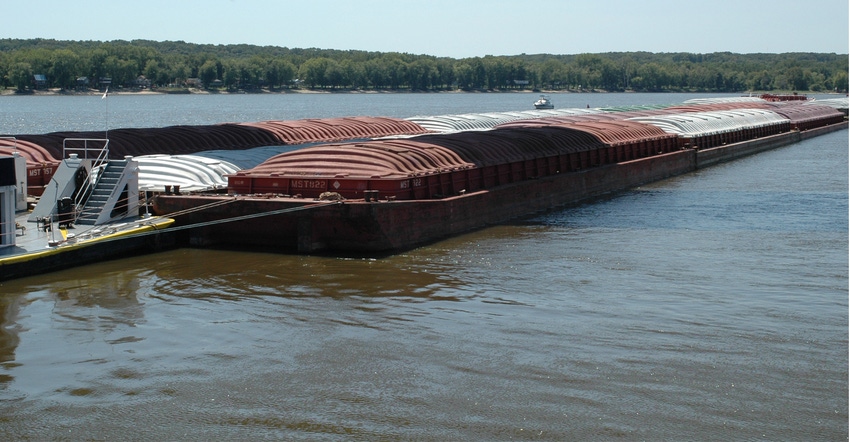
Iowa’s agricultural products, including beef, corn, pork and soybeans, have become victims of a trade war meant to benefit the U.S. manufacturing industry. That’s the view of leaders of the Iowa Cattlemen’s Association and Iowa Corn Growers Association.
In addition to a 25% tariff on pork and ethanol that went into effect on April 2, the Chinese government announced a proposal to increase tariffs on U.S. soybeans, corn and beef by 25%. The April 4 tariff proposal by China on U.S. products imported into China was made in retaliation for tariffs levied by the Trump administration on Chinese products entering the U.S.
“The Chinese export market for beef has been growing since 2017, when U.S. beef was allowed into China for the first time since 2003,” says Matt Deppe, CEO of ICA. “An additional 25% tariff, on top of the 12% tariff currently in place, definitely has the potential to slow that growth and, ultimately, hurt our Iowa cattle producers.”
China retaliation not surprising
The U.S. Meat Export Federation says U.S. beef exports to China totaled 3,020 metric tons valued at $31 million in the second half of 2017, following the market reopening. In January, U.S. beef exports reached the highest monthly volume to date at 819 metric tons, valued at $7.5 million.
“It’s not surprising that China retaliated through agricultural tariffs. The U.S. truly feeds the world and exports are an important market for farmers, especially farmers in Iowa,” says JanLee Rowlett, government relations manager for ICA. “These proposed tariffs have already affected corn, soybean and cattle futures, and our top priority now is ensuring that they do not go into effect. We are hopeful that the Trump administration can resolve this trade war before farmers are hurt more.”
Bilateral agreements
The ICA’s policy, developed and ratified by its 10,000 members across Iowa, supports trade agreements that benefit beef producers. Following U.S. withdrawal from the Trans Pacific Partnership (an agreement that included 11 other countries, including several major U.S. beef importers), ICA’s focus has been on preserving the positive aspects of NAFTA. And on advocating for bilateral trade agreements, like the recently renegotiated U.S.-Korea Free Trade Agreement, which includes favorable terms for U.S. beef exports to South Korea.
Iowa has over 27,000 cattle producers and is fourth in the nation for cattle on feed. A majority of Iowa’s beef producers are also corn and soybean farmers. The tariffs on ethanol, corn and soybeans are concerning to farmers, given the current ag economy. Net farm income for the U.S. is expected to fall in 2018, the fourth time in five years.
Iowa corn needs Chinese market
The Iowa Corn Growers Association also is concerned about the tenuous tariff situation between the U.S. and China.
“Our state has enjoyed a long-standing and prosperous relationship with China,” notes Mark Recker, president of ICGA, who farms near Arlington. “Iowa corn farmers have worked for decades to support fair and open trade practices because we understand that trade is a two-way street. Yet, we’ve operated in a tense trade policy environment with China for several years and have worked hard to diversify our customer base to create new demand for U.S. corn in all forms.”
These recent retaliatory actions by China (increasing tariffs on U.S. products entering China) did not come unexpectedly, Recker says. No one doubted China would punch back with its own tariffs. The imposition of tariffs on U.S. ag exports will make American farmers less competitive at a time when Iowa farmers already anticipate another year of diminished income.
ICGA: Corn can’t lose market
“Our message to President Trump and his administration remains decidedly clear,” Recker says. “We cannot lose this market. Iowa’s farm families must not be collateral damage in a trade dispute. The impact of these potential tariffs does not hurt just one agricultural sector or commodity but threatens the whole industry, and Iowa stands at the epicenter.”
Recker adds, “Corn farmers through our national and state organizations continue to maintain constant engagement with both the Trump administration and our trade partners in China. We remain committed to working long term in the China marketplace. We do have a window of opportunity to reach a mutually beneficial trade position with China before the deadline for the tariffs nears.”
Farmers need the administration to understand the implications for agriculture and to come to the negotiating table with China, Recker says. “We need policies that give farmers consistent access to markets and a level global playing field.”
About the Author(s)
You May Also Like




